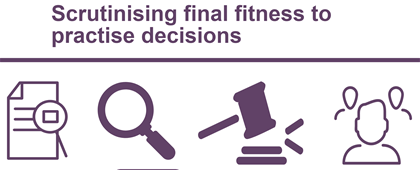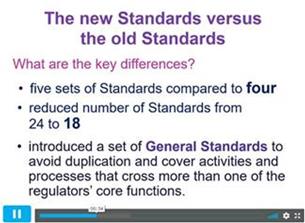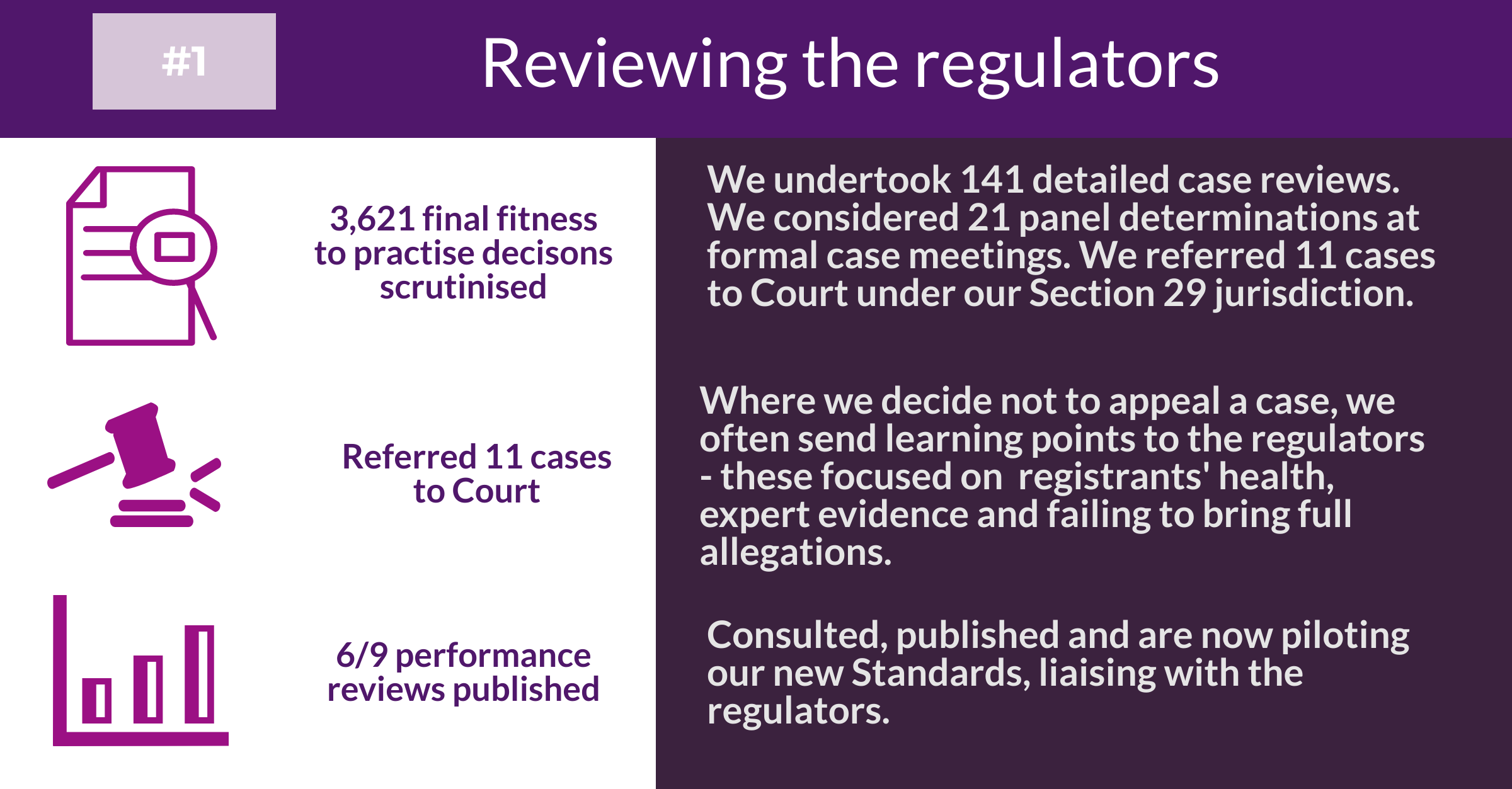Regulatory news

Reviewing the regulators: Scrutinising final fitness to practise decisions
Since the last newsletter we have lodged five new appeals under our Section 29 powers (Section 29 allows us to appeal decisions by the regulators’ fitness to practise panels if we believe they are insufficient to protect the public). We have also become an interested party in one GMC appeal.
In the spring edition of The Standard we reported that we had six cases waiting to be heard; three of those cases have now been resolved/heard. In one of these cases, judgment has been reserved so we will provide an update when it is handed down by the High Court. Here are the summaries of the cases that have been heard or the outcome agreed between the parties.
A GMC appeal against a Medical Practitioners Tribunal Service decision about a doctor who administered anti-psychotic medicine to this wife without her knowledge
This was an appeal against the MPTS’ decision to suspend a doctor from practice for four months without a review. The doctor had administered antipsychotic medication to his wife on several occasions – by adding it to her tea. He had done this with neither her knowledge nor her consent. His wife was not being treated by a psychiatrist, it was not clinically indicated, and it was outside his clinical competence. He also did not make any record of the administration or report it to his wife’s GP.
Despite finding the registrant’s evidence before it inconsistent, evasive and less than candid in a way that minimised the seriousness of his actions, the Tribunal did not order a review hearing. The GMC Assistant Registrar used powers under the Medical Act to impose a review hearing. The GMC elected not to appeal the decision under Section 40A, but the registrant did appeal the MPTS decision. Both the Authority’s appeal and the registrant’s appeals were resolved by an agreement with the GMC that the case be re-heard by a panel to determine the appropriate sanction.
A GMC case in which a doctor lied about the fact that a mistake was made during surgery
We appealed this case because the doctor lied to his patient about knowing an error had occurred in surgery (a surgical screw was floating and not in the bone). The MPTS panel noted the doctor was in a ‘difficult’ meeting with a former patient who had complained about him. The panel said that the doctor had the patient’s best interests at heart when he decided not to tell the patient the truth. We considered that this did not accord with the professional duty of candour. We argued that the public interest required a finding of impairment in these circumstances. Whilst the Court did not agree with us that an impairment finding was required, it did agree with our argument that the panel was wrong not to impose a warning. The case will not be remitted back for rehearing as the Court has imposed a warning which will be published on the GMC register.
An HCPC case involving a social worker who had lied on job applications about the reasons for her dismissal from a previous job
This appeal has been settled by way of consent order (that is without going to a hearing). This was an appeal against an HCPC decision to impose a caution in relation to a Social Worker who lied on job applications about her dismissal from a local authority for making six false mileage claims. When she needed to take time off to attend the HCPC hearing in relation to the false claims, she told her new employer that the reason she was requesting leave was to attend an HCPC hearing to support a friend. The registrant was suspended following that first hearing, but the panel imposed a caution in relation to this further dishonesty. The HCPC did not provide full details of the registrant’s behaviour to the panel which concluded that her actions were out of character. The consent order agreed by the parties quashed the previous decision and remitted the case for a fresh hearing with new allegations to address all the registrant’s dishonest behaviour.
Social Work England
Social Work England (SWE) will take over regulation of social workers in England from the HCPC on 2 December 2019. SWE will operate a different fitness to practise model from the other regulators with a large proportion of cases eligible for disposal outside of panel hearings with staff members agreeing what will be known as 'accepted outcomes' with registrants.
Although SWE will come under the Authority’s oversight, under the current legislation, we may not have the ability to scrutinise accepted outcomes and appeal to Court if they are insufficient to protect the public as we currently do under our Section 29 powers with panel decisions.
We are in discussions with officials to try to find a solution and avoid the gap in public protection that may otherwise arise, however in the absence of a change to our legislation, we are considering options for scrutiny under our performance review process although this will not allow us to seek corrective action in individual cases.
We are also currently working with colleagues at SWE to look at the practicalities of how we will operate the performance review and Section 29 processes (for those cases that do go to a hearing). Staff from the Authority will be visiting SWE to provide training and briefing for panel members and other decision-makers on the Authority’s work and approach to fitness to practise.
SWE are currently consulting on a number of pieces of guidance relating to fitness to practise, continuing professional development and registration and the Authority will be responding to these. You can find more details of the SWE consultations in Regulators' update.
Reviewing the regulators: performance reviews
Piloting the new Standards of Good Regulation
From 2020, we will begin assessing regulators against the new Standards of Good Regulation. The new Standards were agreed by our Board in November 2018. We use the Standards of Good Regulation to assess regulators’ performance on an annual basis through our performance review process. A total of 18 Standards sit across five areas:
- General Standards
- Guidance and standards
- Education and training
- Registration
- Fitness to practise.

To prepare for the introduction of the new Standards, we have been piloting a selection of these with the regulators. This has allowed us to test the evidence framework (which we developed in consultation with the regulators in early 2019) and how we will assess against the new Standards. It also provided the regulators with an opportunity to check their progress towards meeting these Standards.
We ran the pilots from May to September, and are now assessing the results. Each regulator will receive an individual report and we will be publishing a summary report outlining the learning from the pilots in October.
Find out more about the new Standards or watch our short animation.
Latest performance reviews published
Since our last newsletter, we have published performance reviews for:
- General Dental Council: the GDC met 22 out of 24 of the Standards. The GDC continues to meet the majority of the Standards, however, in this review period we saw a deterioration in its timeliness in progressing fitness to practise cases. Read the full report or see a summary in our two-page snapshot.
- General Medical Council: the GMC met all 24 of the Standards during this review period. You can read the full report or see a summary in the snapshot.
- General Osteopathic Council: the GOsC met all 24 of the Standards during this review period. Read more in the full report or in the two-page snapshot.
- Health and Care Professions Council: the HCPC met 18 out of 24 of the Standards of Good Regulation. Though, the HCPC has taken action to address our concerns, the six fitness to practise Standards it has failed to meet in our previous two reviews remain unmet. Find out more in the full report or see a summary in the two-page snapshot.
Look out next week for the latest performance review for the General Optical Council.
Reviewing the regulators: key statistics for 2018/19
We published our annual report in early July. You can find out more about our Section 29 work and our performance reviews during 2018/19 in the full report. Or read through the highlights in our summary. You can also look at the key statistics for reviewing the regulators during the year.
